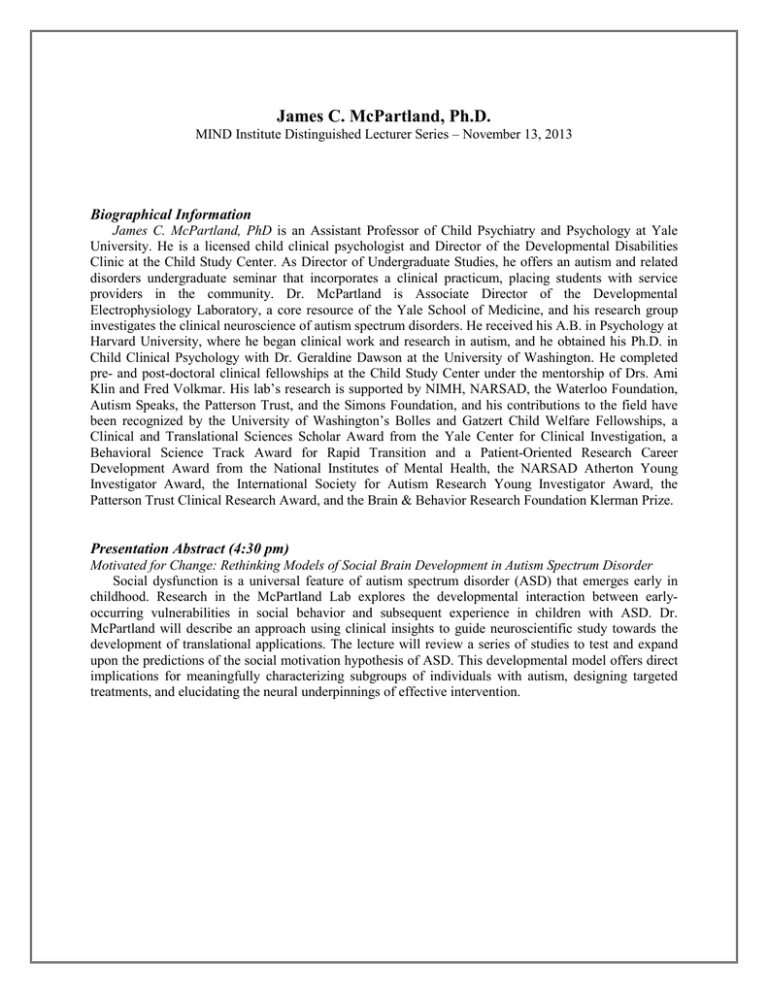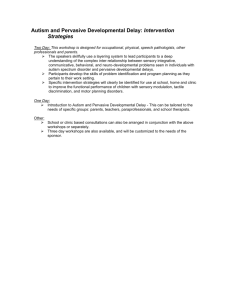James C. McPartland, Ph.D. Biographical Information
advertisement

James C. McPartland, Ph.D. MIND Institute Distinguished Lecturer Series – November 13, 2013 Biographical Information James C. McPartland, PhD is an Assistant Professor of Child Psychiatry and Psychology at Yale University. He is a licensed child clinical psychologist and Director of the Developmental Disabilities Clinic at the Child Study Center. As Director of Undergraduate Studies, he offers an autism and related disorders undergraduate seminar that incorporates a clinical practicum, placing students with service providers in the community. Dr. McPartland is Associate Director of the Developmental Electrophysiology Laboratory, a core resource of the Yale School of Medicine, and his research group investigates the clinical neuroscience of autism spectrum disorders. He received his A.B. in Psychology at Harvard University, where he began clinical work and research in autism, and he obtained his Ph.D. in Child Clinical Psychology with Dr. Geraldine Dawson at the University of Washington. He completed pre- and post-doctoral clinical fellowships at the Child Study Center under the mentorship of Drs. Ami Klin and Fred Volkmar. His lab’s research is supported by NIMH, NARSAD, the Waterloo Foundation, Autism Speaks, the Patterson Trust, and the Simons Foundation, and his contributions to the field have been recognized by the University of Washington’s Bolles and Gatzert Child Welfare Fellowships, a Clinical and Translational Sciences Scholar Award from the Yale Center for Clinical Investigation, a Behavioral Science Track Award for Rapid Transition and a Patient-Oriented Research Career Development Award from the National Institutes of Mental Health, the NARSAD Atherton Young Investigator Award, the International Society for Autism Research Young Investigator Award, the Patterson Trust Clinical Research Award, and the Brain & Behavior Research Foundation Klerman Prize. Presentation Abstract (4:30 pm) Motivated for Change: Rethinking Models of Social Brain Development in Autism Spectrum Disorder Social dysfunction is a universal feature of autism spectrum disorder (ASD) that emerges early in childhood. Research in the McPartland Lab explores the developmental interaction between earlyoccurring vulnerabilities in social behavior and subsequent experience in children with ASD. Dr. McPartland will describe an approach using clinical insights to guide neuroscientific study towards the development of translational applications. The lecture will review a series of studies to test and expand upon the predictions of the social motivation hypothesis of ASD. This developmental model offers direct implications for meaningfully characterizing subgroups of individuals with autism, designing targeted treatments, and elucidating the neural underpinnings of effective intervention.




